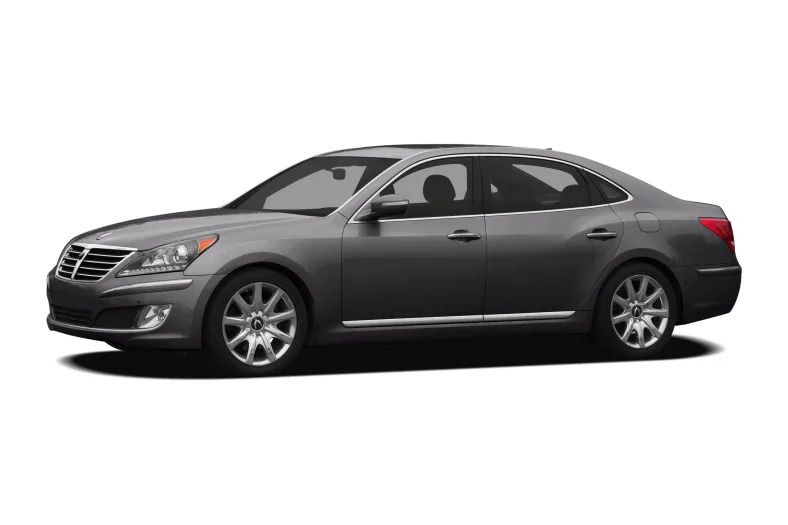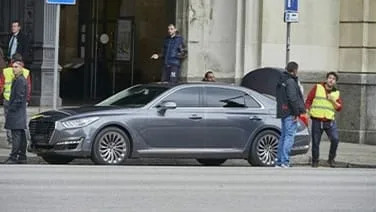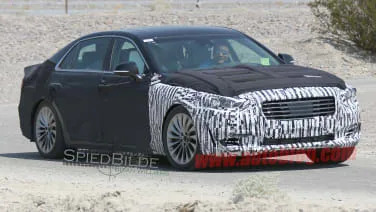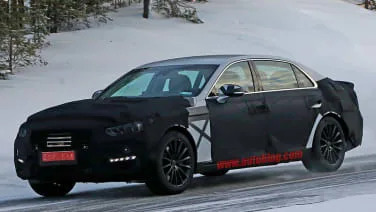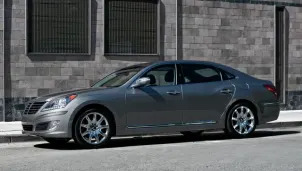2011 Hyundai Equus
What A Difference A Year Makes There was a point in time where if we read one more lede that started with "Hyundai sure is on a roll these days," we would have clawed our eyes out. Fact of the matter, though, is that those words were absolutely true. Hyundai has really come a long way here in the United States, especially in the past couple of years. And the only reason people have stopped writing about Hyundai's forward momentum is because, frankly, we expect nothing less now. Every new product blows the doors off of the one that came before it, and brand-new ventures like the Genesis line or funky-fresh Veloster are nothing short of impressive. But every family has its black sheep, and unfortunately for Hyundai, that might be the largest one in its herd. You see, while Hyundai has worked hard to create a unique brand identity here in the United States by offering cars that are designed specifically with our market in mind, the Equus was simply a vehicle hauled over from Korea with a few minor Americanized tweaks. Don't get us wrong, the Equus is a plenty good car, and through its faults, we praised it in both our initial first drive and follow-up review as being a tremendous value that's pretty darn up to snuff with its competitive set. But over time, can something that's simply a good value work in the highly competitive full-size luxury set? That in mind, we ordered a White Satin Pearl 2011 Hyundai Equus Ultimate for our long-term garage in order to see if after one year of day-to-day use, the big flagship would be able to stand tall with the rest of its Modern Hyundai kin, or simply be another budget-minded also-ran from the days of Old Hyundai. 52 weeks and 22,638 miles later, all we can say is, man, what a difference a year makes. Everyone from young kids to full-size adults felt impeccably comfortable in the Hyundai's rear seats. Our long-term car was a fully decked-out Equus Ultimate with an as-tested price of $65,400. The big win for the Ultimate package is the rear-seat setup, which ditches the bench of the Signature model for a pair of heated and cooled chairs (the passenger-side seat even offers a recline function with footrest as well as massaging) with a fixed center console complete with a DVD entertainment system, dual-zone rear climate control and a refrigerator, among other niceties. This quickly became everyone's favorite spot in the Equus, with our passengers constantly getting a kick out of the sheer luxury offered with this setup. Everyone from young kids to full-size adults felt impeccably comfortable in the Hyundai's rear seats, and throughout the entire year, this feeling never faded. If we could change anything, as Associate Editor Jeff Sabatini noted, it'd be the addition of a one-touch button to bring the rear seats back to their default position. The other fault here is that when you fully recline the …
Full Review
What A Difference A Year Makes There was a point in time where if we read one more lede that started with "Hyundai sure is on a roll these days," we would have clawed our eyes out. Fact of the matter, though, is that those words were absolutely true. Hyundai has really come a long way here in the United States, especially in the past couple of years. And the only reason people have stopped writing about Hyundai's forward momentum is because, frankly, we expect nothing less now. Every new product blows the doors off of the one that came before it, and brand-new ventures like the Genesis line or funky-fresh Veloster are nothing short of impressive. But every family has its black sheep, and unfortunately for Hyundai, that might be the largest one in its herd. You see, while Hyundai has worked hard to create a unique brand identity here in the United States by offering cars that are designed specifically with our market in mind, the Equus was simply a vehicle hauled over from Korea with a few minor Americanized tweaks. Don't get us wrong, the Equus is a plenty good car, and through its faults, we praised it in both our initial first drive and follow-up review as being a tremendous value that's pretty darn up to snuff with its competitive set. But over time, can something that's simply a good value work in the highly competitive full-size luxury set? That in mind, we ordered a White Satin Pearl 2011 Hyundai Equus Ultimate for our long-term garage in order to see if after one year of day-to-day use, the big flagship would be able to stand tall with the rest of its Modern Hyundai kin, or simply be another budget-minded also-ran from the days of Old Hyundai. 52 weeks and 22,638 miles later, all we can say is, man, what a difference a year makes. Everyone from young kids to full-size adults felt impeccably comfortable in the Hyundai's rear seats. Our long-term car was a fully decked-out Equus Ultimate with an as-tested price of $65,400. The big win for the Ultimate package is the rear-seat setup, which ditches the bench of the Signature model for a pair of heated and cooled chairs (the passenger-side seat even offers a recline function with footrest as well as massaging) with a fixed center console complete with a DVD entertainment system, dual-zone rear climate control and a refrigerator, among other niceties. This quickly became everyone's favorite spot in the Equus, with our passengers constantly getting a kick out of the sheer luxury offered with this setup. Everyone from young kids to full-size adults felt impeccably comfortable in the Hyundai's rear seats, and throughout the entire year, this feeling never faded. If we could change anything, as Associate Editor Jeff Sabatini noted, it'd be the addition of a one-touch button to bring the rear seats back to their default position. The other fault here is that when you fully recline the …
Hide Full Review
Hide Full Review
Retail Price
$58,000 - $64,500
MSRP / Window Sticker Price
| Engine | 4.6L V-8 |
| MPG | Up to 16 city / 24 highway |
| Seating | 5 Passengers |
| Transmission | 6-spd w/OD |
| Power | 385 @ 6500 rpm |
| Drivetrain | rear-wheel |
| Curb Weight | 4,449 - 4,486 lbs |
Smart Buy Program is powered by 

